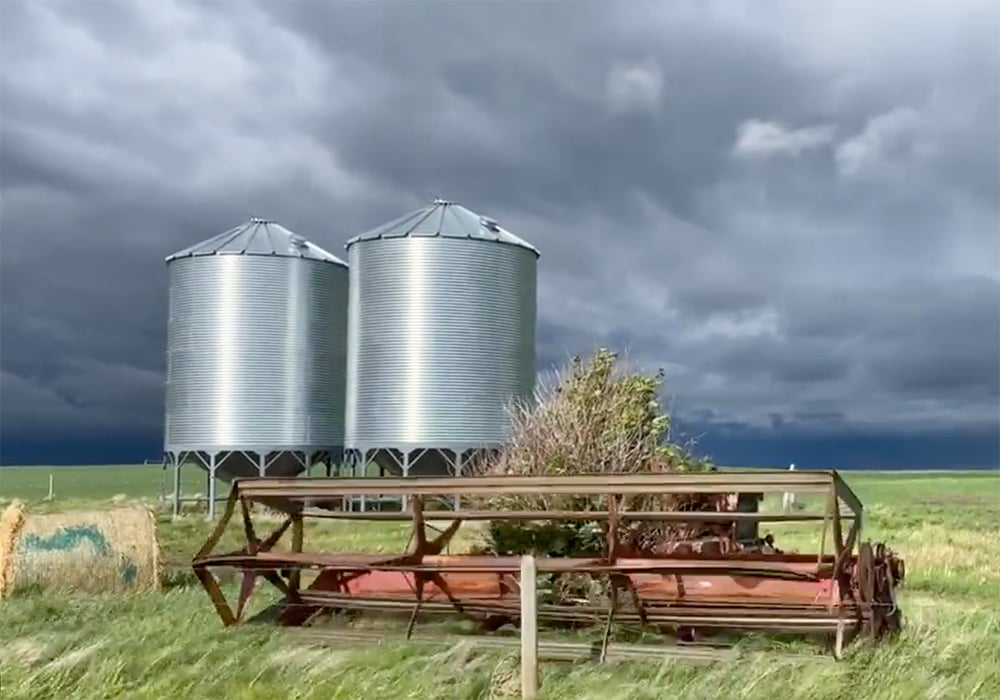It’s turning into another challenging year for western Canadian ranchers with Manitoba just beginning to recover from a wet spring while Alberta and Saskatchewan cattle country remains parched from a dry summer, winter and spring.
For Gerald Vandervalk, who ranches in the Municipal District of Willow Creek, the extremes in weather conditions are stark on his 400-head operation along the foothills of southwestern Alberta. On June 8, the MD declared a state of agricultural disaster due to excessively dry conditions. Four days later, the region was facing a rainfall warning that could see local accumulations of up to 150 millimetres or more fall within three days.
Regardless of what happens, the die is already cast, said Vandervalk and he’s looking to reduce his herd by a quarter, regardless of what happens next.
“My dad is 83 so he’s been on our ranch for 60 years and he says he’s never seen anything like this,” said Vandervalk.
Just getting water for cattle is challenging, following three dry years that have dried up dugouts.
Recovery of tame and native pastures after last year’s drought is still not happening with little fall moisture and an open winter and spring with little snow cover.
“A lot of people, us included, grazed a little harder than we wanted,” said Vandervalk of last year, adding that pastures have been unable to recover because of so little moisture since.
Pastures that had started to green up this spring were beginning to brown by early June, he said, and it’s unclear how the forecasted heavy rains will aid regrowth with some of the grass already gone to seed.
“For farmland, it’s perfect timing for them but in our world, I think it’s a little late,” he said of the effect of the recent June rainfall.
With hay harvest behind schedule and the few remaining grazing spots almost gone, the decibecause it’s not worth keeping a larger herd, he said.
“I know they are talking about rain but I don’t see things getting better. The hay crops will be late and cereals and pellets (for feed) were really high last year and I don’t see them being any lower coming into this year the way things are going,” he said. “We’re just trying to downsize so we can save on some feed costs.”
The MD of Willow Creek’s agricultural disaster declaration wasn’t the only one. Cypress County in southeastern Alberta was the first in the province making that call on June 7.
Cypress Country councillor Blaine Brost said the move is intended to send a message that the situation that began last year isn’t getting any better.
Cypress County reeve Dan Hamilton said indications are that 40-Mile County and Warner County will likely be next to declare agricultural disasters after those areas missed out on recent rainfalls along with a number of parts of Cypress.
The situation only gets worse moving into southwestern Saskatchewan, according to cattle producer Randy Stokke, who has a ranch near Consul.
Recent rain might help, but what has fallen so far isn’t enough.
“It’s worse,” said Stokke of conditions this year compared to last as in 2021 the timing of May precipitation saw at least some grass grow.
“Cows are already leaving this country and guys are having to cut down their herds. A lot of community pastures took big cuts in numbers and are looking at maybe only three months grazing.”
It’s bleak, he said.
“Most guys used the grass they had last year and there wasn’t a lot of carry over and then there were the winds,” said Stokke.
His rural county, Northern Sunrise, has sent a letter to the province indicating the emergency situation developing in the region. Stokke said the Canadian Cattlemen’s Association is making federal MPs aware of the situation.
Stokke said there needs to be disaster programs in place early this year to provide confidence for producers if conditions don’t improve.
















